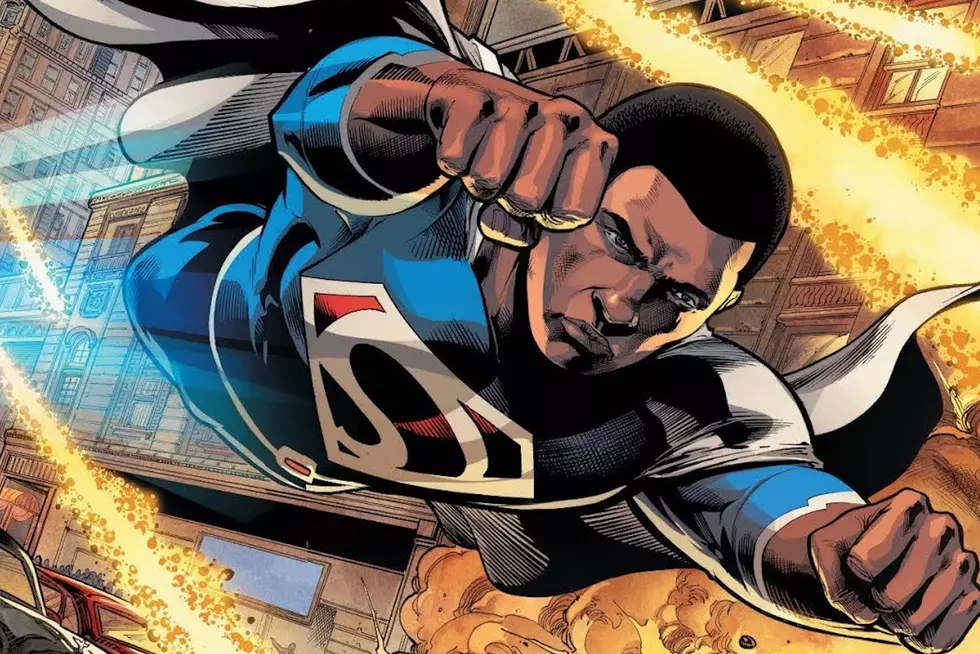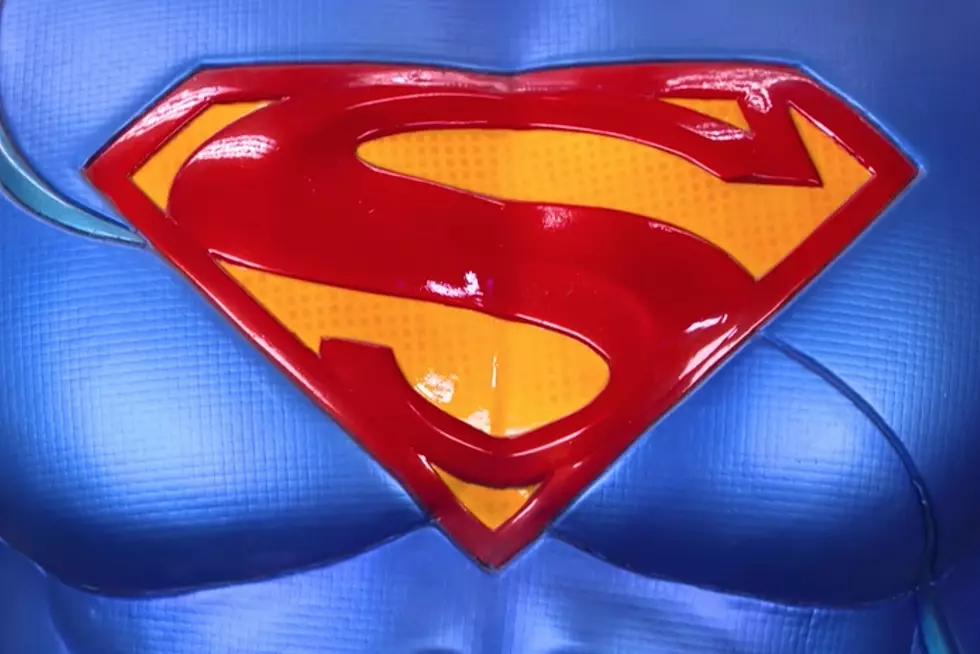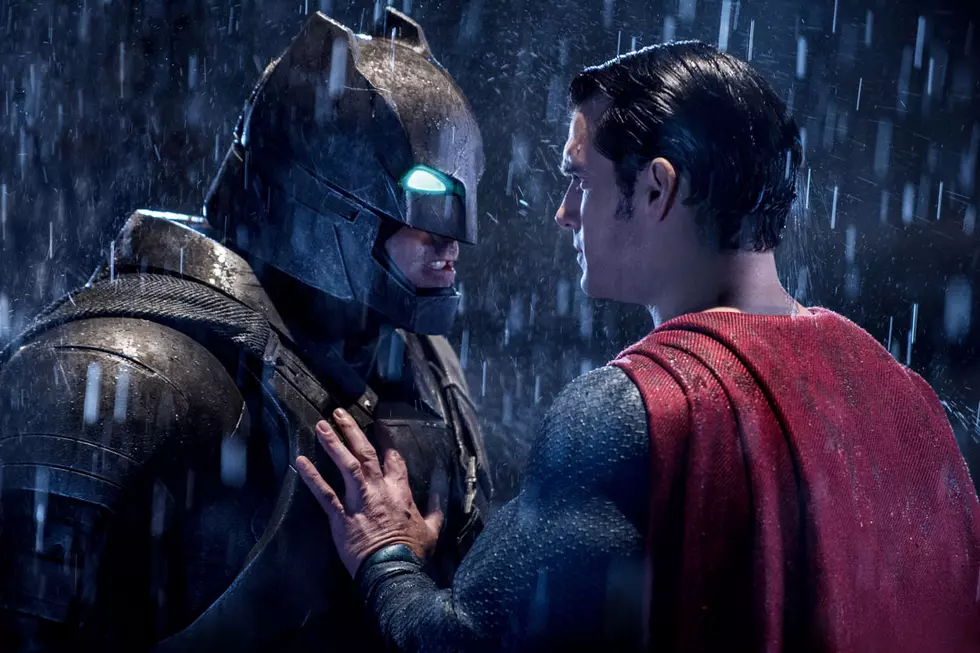
ComicsAlliance Reviews ‘Superman: The Movie’ (1978), Part One

Chris Sims: Well, well, well. Look who's come crawling back.
Chris: That's right, everyone: David and I have reunited to take on another comic book film franchise. And really, after we finished the entire Batman franchise and Blade, we knew there was only one place to go: 1978's Superman: The Movie.
 David: Really, we're just continuing on our Apollonian trajectory.
David: Really, we're just continuing on our Apollonian trajectory.Chris: I think we'd need to do Purple Rain for that. Really, though, as much fun as we had talking about the Batman movies, the Superman films were even more important in bringing comic books to a mass audience. Superman '78 was a phenomenon, and its influence on comics can still be felt almost 35 years later. It's also, and I'm just going to come right out and say this up front, one of the most overrated movies of all time.
David: It really says a lot that this movie was so desperate for legitimacy that it made Marlon Brando the first name you see, even though he's in the movie for like five minutes.
Chris: I think it's worth noting that he and Gene Hackman -- who were both Academy Award-winning stars -- get billing not only above Christopher Reeve, but above director Richard Donner and the title of the movie. Essentially, they were bigger draws than Superman.
David: "What the hell is a Superman? Is this some kind of Nietzsche movie? Oh, with Marlon Brando? That sounds like a sweet art-house flick!"
Chris: I will say, though, for a guy who refused to memorize his dialogue and read off cue cards, Brando does pretty well for himself.
David: Dude, he's Marlon Brando. He probably flew to Krypton and lived there for ten years. Method acting!
Chris: Seriously, though, considering that I hate seeing Jor-El do anything other than put that baby in a rocketship, Brando does well. So does Hackman, and especially Christopher Reeve, who really does look like he stepped right off the page. But this movie... It's not great. I know everyone saw it when they were kids and loves it to pieces, but it is so long, and frequently so, so boring.
David: Well, it's respected because it was the first big superhero movie to take its source material seriously. This is the origin of the Straight Take.
Chris: And that's to its detriment, I think. It's really at its best when it's embracing the goofiness of it, like in the Daily Planet newsroom and any time they're pointing a camera at Gene Hackman. That guy almost makes his stupid real estate scheme sound enjoyable to watch.
David: Honestly, I can see why this was a Thing. If you think about this in the same context as, like, the first Star Wars, it's just as -- if not more -- visually impressive, and it approaches its subject matter with respect. I think we're about to hit another Justice League situation, since honestly, my respect for this movie increased after rewatching it.
Chris: With the exception of seeing Superman II about five or six years ago, I haven't watched the Superman movies at all in my adult life. I can't remember a thing about III and only have vague memories of IV, so it honestly feels like I'm coming to this pretty fresh. And man, I will take Batman '66 over this any day of the week. But before anyone starts writing us hate mail -- which only Uzi reads anyway -- what do you say we get right to it and see how it all played out on the big screen?
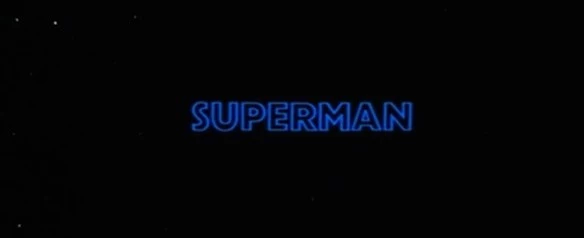
David: Time for an extended John Williams credit sequence!
Chris: First things first: You guys might want to settle in, because it's going to be around 47 minutes into this thing before you see Superman. Instead, we open on this black-and-white sequence of a kid reading Action Comics out loud, with the legend "June, 1938," and boy, it is kind of pretentious.
David: I love the implication that the Kryptonians were like, "Dude, this Superman comic is really popular! Let's give this kid an S crest so people think he's a dope comic book hero!"
Chris: This intro... I just don't get it, you know? Are we supposed to think that the movie is being read as a comic by the little kid? If so, why is it set in 1978? And why didn't they just go ahead and use the actual cover of Action Comics #1 instead of mocking up a fake version with a rocketship (and no Superman) on the cover?

David: I guess it's supposed to... honor history? Honestly, I'm at a loss, I can't fathom a narrative purpose for this segment, other than "Dude, it's frickin' Superman!"
Chris: It's the first of many strange choices, but we move right from that into a four-minute credits sequence that finally leads us to the snowy, crystalline movie version of the planet Krypton, and its giant Boob of Justice.

David: You saw a big white dome, and you thought boobs?
Chris: Yeah, what did you think?
David: I thought... a white dome.
Chris: Well obviously you don't have much imagination. Within the... dome, we get a long sequence of Jor-El basically smack-talking the soon-to-be-Phantom Zone criminals, Non, Ursa and Zod. And again, I'm not really sure why they thought this was a good way to open the movie. I get that they filmed Superman and Superman II back-to-back and that there was originally a plan to have them breaking out at the end of this one, but it's kind of weird to lead with this when the final versions of the films won't see them back until the sequel.
David: Was this the first major blockbuster movie made with explicit plans for a sequel?
Chris: I'm not sure. Star Wars was released earlier, obviously, but it also stands on its own well enough that it doesn't require another installment, which would've been handy if it were a flop.
David: Also, "the son becomes the father, and the father, the sun" is still pretty genius in the context of Krypton blowing up.
Chris: Oh wow, I never got that about Jor-El's line before, but that is good. Which, really, is the thing about this movie: tons of great lines, great shots, great individual sequences, but all dropped smack in the middle of like twenty minutes of Jor-El wandering around in his glowing aluminum foil outfit.

David: It's true, but honestly, it's artfully made and well-designed. I like the look of it. I dunno if they needed to use it as the template for every Superman comic after 2004, but I like it. Speaking of desperate pleas for legitimacy, the first dialogue of the movie: "This is no fantasy... no careless product of wild imagination."
Chris: As much as this is a movie that opens with a shot of a comic book, lines like that and the redesign of Krypton really feel like they're trying to divorce it from the version in the comics. I'd be really curious as to what exactly the thought process was behind making Krypton a big snowy crystal planet, and of using the crazy glass square instead of the Phantom Zone projector.
David: Probably a combination of budget and the fact that it probably looked more majestic and sci-fi at the time. We're miles away from the art-deco futurism of Siegel and Shuster's original comic book Krypton, which it hadn't come back around to being ironically cool like it is now.
Chris: That's a good point, but I still feel like there's a lot of fixing what ain't broke in this movie. As much as this is the origin of treating super-heroes seriously in film, it's also the start of making those changes in order to "appeal to a wider audience" when you don't really need to. You can draw a straight line from Crystal Krypton to the Joker killing Batman's parents, for instance.
David: Whoa, what? Chris, that makes absolutely no sense. Changing the aesthetic of a location is absolutely nowhere near changing the randomness of a hero's origin story.
Chris: I don't mean just the Crystal Krypton specifically, but also Jor-El's Floating Ghost Head and Superman spending 12 years on an acid trip to learn about Einstein. But we'll get to that in a minute.
David: I still don't think it's comparable, to be completely honest. It's the exact same level of freedom taken in the Nolan Batman movies we love. The aesthetics and details change, but the themes and concepts remain the same. That's what's important to me, at least.
Chris: Agreed, but I think it's the start of it. Batman '66 was more or less faithful to Silver Age Batman comics. Superman is the first one to start tweaking the source material to better fit the vision of the filmmakers. Again, not necessarily a bad thing, but it leads right to those changes getting bigger, and eventually Superman and Batman don't even have trunks. It's out of hand, I tells you!
David: "Eat it, grandpa!" - The Legion of Super-Heroes, Third Edition.
Chris: Anyway, while we've been dithering about aesthetic purity, Jor-El has failed to convince everyone that Krypton is about to blow up, probably because he's not pronouncing the name of the planet right. I wouldn't trust anyone who told me that there was about to be an "Arthquake" either.
David: At least he isn't screaming "LAAAAAAAAAAAARAAAAAAAAAAAAAA!" in a theaterical presentation of A Skycab Named Desire.
Chris: No, but he is putting his baby into a giant egg with a bunch of pointy shards of glass.

Chris: Jor-El is the worst father ever.
David: Vagina dentata!
Chris: Wait, you bagged on me for thinking the dome looked like a giant boob, but your'e going straight to vagina dentata jokes? Is it too late to get Caleb back?
David: Is it too late for you to use the same joke with me you used in all the Caleb columns?
Chris: At this point, I'll even take Andy and he can tell us how his cousin's roommate's girlfriend's aunt was Marlon Brando's personal wigmaker.
David: Either way, Brando's time in this movie is pretty much over, and they paid him a million dollars for this.
Chris: $19 million. He had a percentage of the box office. So, twenty minutes into the film, baby goes in the rocket, Krypton explodes, and then we watch it make the journey across space in what feels like real time.
David: And now, it's time for the Cliff's Notes version of Smallville.
Chris: They do in 20 minutes what that show did in ten years, and it's still too damn long. But still just as weird, what with Naked Superbaby and then Martha Kent being immediately stoked about kidnapping this toddler.

David: Can I just say that I love Superbaby? He is just so apathetic.
Chris: I'm not wrong about Martha, though, right? Her immediate "oh he doesn't have any family" is pretty weird.
David: It's really interesting seeing this right after seeing Grant Morrison's All-Star Superman version of this same story. I mean, the entire "let's take this baby" thing has always seemed suspect. And this is set seemingly like in the '40s or something, which explains why the military isn't there immediately.
Chris: The fact that Martha is so baby-crazy that she doesn't even entertain the possibility that this kid might have parents somewhere is what gets me. The Kents, of course, end up keeping him and naming him Clark, and he grows up, has a rough time hiding his powers in high school, and outruns a train. And they must've blown the entire SFX budget on the flying scenes, because the train-running is hilarious.
David: FUN FACT: During this current rewatch, a friend of mine (big ups Matt Singleton) pointed out that in the extended director's cut, they call the girl who watches him running from the train Lois.
Chris: Unfortunately, even with his ability to outrun a train, Superman can't stop Pa Kent from having a heart attack, which is how we get our second father's death scene in half an hour.
David: Oedipus: The Movie.
Chris: But just in case you thought we were done with fathers, don't worry! After Pa Kent's funeral, Clark finds the big green crystal Jor-El put in his rocket, and decides that he needs to leave his widowed mother alone to go, and I quote, "north."
David: This entire sequence makes absolutely zero sense. Like, there is absolutely no stated reason for Clark to go "yeah, I'm going to throw this crystal in some ice in the Arctic."
Chris: It doesn't. And I know I'm blowing through this pretty quick, but trust me, the actual movie takes for-frigging-ever to get to this point. You could cut at least 30 minutes off of this thing just by cutting out the parts where people exchange long, meaningful looks, or talk super slowly as a means of conveying emotion. Then again, I'd be fine just omitting out the first 45 minutes entirely, but that's just me.

David: Well, it just hits a point where it's like "we've got some Krypton stuff, and some Smallville stuff, and... he becomes Superman... somehow?"
Chris: To be fair, I do like that he goes to the crazy Santa Claus Conquers the Martians version of the North Pole, but then he throws the crystal into the snow and we watch the construction of the Fortress of Solitude -- again, in real time. Just wake me up when Jor-El's floating head shows up, will you?
David: For TWELVE YEARS.
Chris: This is the single craziest thing about this movie, and considering Lex Luthor's master plan, that's saying something: Clark goes into the Fortress of Solitude, conjures up Jor-El's giant floating head - because what kind of hero would he be if he had to figure things out on his won? - and then gets dragged onto some kind of weird outer-space acid trip where he learns about physics. For. Twelve. Years.
David: Hey kid let me just take TWELVE F***ING YEARS OF YOUR LIFE for me to lecture at you. Gotta make up for lost time. He's just Space Jonas Venture.. And Ma Kent was never like, "Hey, dick, why didn't you tell me you were talking to your space dad for twelve years?" Like, this is his compassion, he's just like "I'm going north"? I
Chris: And the thing is, this sequence really has no other purpose except to get us from Teenage Clark Kent to Grown-Up Christopher Reeve. It's not like Superman beats the bad guy in this movie by going "Oh, well when I spent eight months as a disembodied consciousness studying Kryptonian physics, I figured out how to reverse a nuclear explosion."
David: Well, I mean, what Kryptonian physics? I dunno, it's certainly very Jesus-inspired, but was Mark Waid's Birthright the first major Superman story to have him traveling around the world and learning about different cultures and stuff before coming to Metropolis and putting on the costume? Because that always made way more sense to me than twelve years of ghost dad.
Chris: Anything would make more sense than twelve years of ghost dad. Especially since it ends with Jor-El's floating head turning into an ice sculpture and Superman standing there in his costume.

Chris: That sh** is like the last boss in Starfox, for real.
David: And then he just flies out. This should have been the end of Smallville. Actually, it was.
Chris: This scene has that great moment where Jor-El tells him that he believes humanity has great potential for good, and that's why he sent Clark there -- the only part of the script where the Jesus metaphor really works -- but why did it have to be in with that whole 12 years nonsense?
David: Four scriptwriters, I'd guess. So Superman finally flies out of the Fortress of Solitude, and it's a good thing. I wanted to believe a man could fly, but after 47 minutes of setup, I had my doubts. And then, he becomes a reporter for no reason! Because the plot demanded it!
Chris: Yeah, it's weird that they didn't go with the classic explanation of Clark wanting to be able to hear about danger as soon as he could, but I can forgive it. Because finally, after all that (plus another way-too-long sequence looking through Jimmy Olsen's camera) we get the first genuinely good scene of the movie. We meet Lois, and while I've never quite gotten the whole character quirk where she can't spell, I like the idea of her gleefully reporting on these horrible, shocking crimes because they make the best stories.

Chris: Even if she does tell Perry that this one's great because it has "the ethnic angle."
David: Okay, here's the thing about Margot Kidder as Lois: she reminds me EERILY of Rashida Jones.
Chris: Man, I think you are alone on that one.
David: In terms of mannerisms and body language, I'm standing by it.
Chris: Kidder has always struck me as an odd choice. She does all right, but since I was a kid, I always thought Karen Allen would've been an amazing Lois Lane.
David: I also just had to Google her, but true.
Chris: I should've just said "Marion from Raiders," huh? Seriously, imagine how great it would've been if she'd barged in on Clark's superman story and yelled "I'M YOUR GOD-DAMN PARTNER!"
David: Man, I haven't seen Raiders in forever.
Chris: I haven't seen Crystal Skull yet. Maybe that's what we should do after (shudder) Superman Returns.
David: Hey, man. We did Catwoman, that means we have to do Steel.
Chris: We'll cross that bridge when we come to it. This scene also gives us our first look at Clark Kent, and as much as I think this movie's overrated, there's no getting around the fact that Christopher Reeve is amazing.

David: It's a fantastic job, both in and out of the costume. There's a very good reason it's the template for basically every Superman/Clark thing forever after.
Chris: He makes this movie. The gag about him being the fastest typist Perry White has ever seen is actually really funny, and the scene where he and Lois get mugged and she kicks the guy in the face and Clark grabs the bullet out of the air and then "faints" so that Lois doesn't know is darn near perfect for both of those characters.

David: Or the way he stands in front of Lois looking fake-chivalrous but he's really trying to deflect any bullets so they don't hurt her. It's fantastic stuff. And he has some great delivery on the one-liners.
Chris: Especially with how he honestly tries to talk the guy out of mugging them! It's a great moment. If only this movie had started with Clark showing up at the Daily Planet instead of all that other stuff. But now that we've got our hero, it's time to meet our villain: Lex Luthor.
David: This entire sequence feels like it's right out of Batman '66. It even has the sycophantic, sexy henchwoman.
Chris: It starts off with another oddly extended sequence of cops trailing Otis The Henchman through the city that goes on forever, but it leads to a nice moment of Luthor using his crazy underground lair's science trickery to push one of the detectives in front of a subway train. Dude is ruthless.
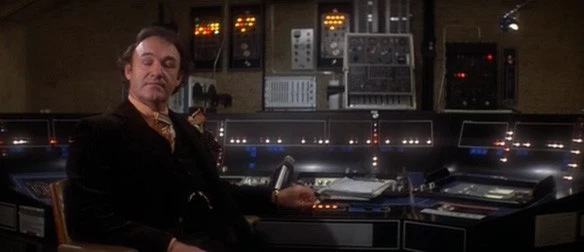
David: I love how he rubs his finger across the button he presses to kill the cop, like he's moving it in analog form, dragging it out so the wall moves as slowly as possible. Hackman's Luthor is definitely over-the-top campy, but they also effectively get across just what a gigantic, vindictive dick he is.
Chris: The underground hotel is awesome, Hackman's performance is awesome, even the lines where he refers to himself as "the greatest criminal mind of a generation" and "the greatest diabolical leader of our time" are awesome. But that plot... That plot. I think they were in a real bind with Luthor. Obviously you want to use him, but if you're doing what's ostensibly the "first Superman story," it's hard to make him work. Most of his character in the comics is just built around wanting to kill Superman, so giving him something to do before Superman shows up is tough. Still, I'm pretty sure they could've come up with something better than a nuclear real estate scheme.
David: His entire thing about land also makes no sense, and is remarkably backwards-thinking for Luthor's character, since he seems convinced that Earth will remain valuable, but... I guess it's not a very cosmic view of the Superman mythos. I guess they're trying to get across his greed, but as I said, the entire milieu as well as the facts of his plot are all like something out of Batman '66. It's mystifying, and a serious tonal shift from the rest of the movie.

Chris: Right. I don't even mind that it's silly, just that his scheme is to get rich, and not, you know, take over the world. There's no real grandeur to it, just violence. What does Luthor need with money? He's got a baller-ass underground hotel.
David: Like, you get this really wry Superman with his playful sense of humor and this altruism that's so dead-on, and he's fighting a circus clown with a henchman who does pratfalls.
Chris: If the first part of this movie hadn't been so heavy handed and glum, I think Hackman's Luthor would fit in much better, which is another point in favor of what you said about the screenwriters. Much like Batman Returns, the seams are showing.
David: It's worth mentioning that the first draft of this script, and the general story, came from Mario "The Godfather" Puzo. I'm not aware of what the differences were, but I'd be interested to know.
Chris: According to Wikipedia, Tom Mankiewicz, who was brought in by Donner to write a "less campy" version, said "not a word from the Puzo script was used." He also said it was like 550 pages long for both movies, which meant that we could've gotten a Superman movie that was somehow even longer than this thing.
David: Wow, so Puzo's original was super campy? That's interesting, and I guess where the interpretation of Luthor came from. I can't imagine what the original was like, then.
Chris: Probably more like Superman III. Back at the Daily Planet, Lois is getting ready to go interview the President on Air Force One, and she's decked out in this hilarious 1940s reporter cosplay, right down to a hat. She's even taking the Planet's helicopter, because -- and this might be hard to believe -- there was actually a time when newspapers made so much money that they could afford things like that.
David: I kind of got the '40s fetish back when it was actually taking place in the '40s, but it makes zero sense here other than to try to emulate the original Action Comics, which it clearly holds in high regard after the ridiculous opening sequence. The best part about the helicopter is the Daily Planet branded jumpsuits that they wear with the logo stenciled on the back.
Chris: Unfortunately, Lois's interview goes out the door when something goes wrong and the chopper ends up crashing back onto the edge of the roof, leaving her dangling over the street below. But on the other hand, when Clark sees her, she's about to get the single best story any reporter could ask for.
David: But first, we need a fanboy pandering moment with Clark realizing he can't change in a half phone booth! So instead he just opens his shirt in the middle of the street and then runs into a rotating doorway to do it, I guess stopping the doorway after he leaves it at superspeed so it doesn't randomly start spinning to passers by.
Chris: That scene is worth it just for the dude who says "Say, Jim! WOOO! That's a BAD OUT-FIT! WOOOO!"

Chris: Seriously, I love that guy. He is the best character in this movie. Literally the only way it could be better is if it was actually Ric Flair. I love that he's the first person to ever see Superman fly, and his response is just "WOOOO!"
David: I love how that totally clashes with the '40s aesthetic, too.
Chris: Lois falls, but Superman saves her, because saving Lois Lane is what Superman does, and we get the pretty great "You've got me? Who's got you?!" line. Then, just to put the cherry on top, he saves the helicopter with one hand. It is, no lie, a pretty solid Superman moment.
David: And that smile! Reeves pulls off an... altruistic smugness, almost. It's difficult to describe. He should be so punchable, but he's relatable.

Chris: That's exactly it: The line about flying being the safest way to travel should be so corny, but he delivers it in such a charming, friendly manner. It's a top-notch scene.
David: It's a great line, and that wry humor still defines so much of the character for me. Certainly so much of Morrison's interpretation comes from that delivery, I'd say. It's so earnest.
Chris: And so we are introduced to our hero for the first time, plus the start of his relationship with Lois Lane, all while Luthor's plot hangs over their head. Next week, we'll see how it all pans out, as David and I return for the next exciting installment of Supervillains!
More From ComicsAlliance



